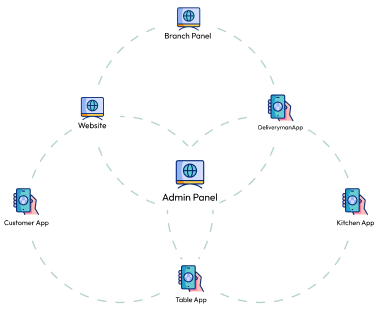Introduction OverView
A CRM that integrates reservation and table management is a must for restaurants of all sizes. With features like real-time table availability and guest preferences, staff can efficiently manage bookings and ensure that the customer experience is smooth from start to finish. A reservation system that allows customers to book online can also reduce wait times and enhance convenience.
Knowing your customers is essential for building loyalty and personalizing the dining experience. A CRM should enable the creation of detailed customer profiles, which can track visit frequency, special requests, and even dietary preferences. This data allows restaurants to offer a more personalized service, such as customized greetings, tailored menu suggestions, or special promotions on birthdays or anniversaries. A powerful CRM should seamlessly integrate with marketing and loyalty programs. Whether it's sending out personalized promotions, birthday discounts, or reward points for repeat visits, the ability to automate these campaigns ensures consistent engagement with customers. Additionally, segmentation features can help target specific customer groups with the right messaging based on their preferences and behaviors.
Order and Sales Tracking
An efficient CRM system should allow real-time tracking of orders and sales data. Managers and restaurant owners should be able to monitor daily sales, analyze the performance of menu items, and identify top-selling dishes. This data is invaluable for decision-making, inventory management, and adjusting marketing strategies.
Inventory and Supply Chain Management
Inventory management can make or break a restaurant's profitability. A CRM that integrates inventory tracking with sales and order history ensures that you never run out of stock on popular items. Additionally, suppliers can be managed directly through the CRM, allowing for seamless orders and timely stock replenishment.
Feedback and Review Management
Customer feedback is crucial for improving service quality. A good CRM should allow restaurants to gather customer feedback directly through the system, whether via post-meal surveys or online review monitoring. This feedback can then be used to identify areas of improvement and build stronger relationships with guests.
Employee Management and Scheduling
Restaurant CRMs should not only manage customer relationships but also streamline internal operations. An employee management feature helps restaurant owners schedule shifts, track hours worked, and even monitor employee performance. Integrating employee data with customer feedback can help managers identify strengths and areas for training, ensuring consistent service quality.
Reporting and Analytics
Data-driven decision-making is essential in today's competitive restaurant industry. A CRM with strong reporting and analytics capabilities enables managers to assess financial performance, customer preferences, and operational efficiency. With these insights, you can optimize menus, improve customer experiences, and fine-tune your marketing efforts for maximum impact.
Mobile Access
In a fast-paced restaurant environment, managers and staff need to access data on-the-go. A CRM with mobile access ensures that critical information like reservations, sales data, and customer feedback is available at all times, whether you're in the kitchen, dining area, or office. Mobile access enhances the flexibility and responsiveness of your team.

Features That Redefine Single or Multi-Branch Restaurant Management
From a robust admin panel and branch management tools to customer-friendly apps and seamless kitchen integrations, our all-in-one solution delivers every feature you need to elevate your restaurant operations across multiple locations.
Buy Now